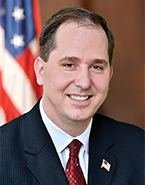NY Needs Food Security, Says Norris
Launches New Food Insecurity, Farm Resiliency, and Rural Poverty Initiative
Assemblyman Mike Norris (R,C-Lockport) joined colleagues from the Assembly Minority Conference this week to launch their newest omnibus package known as the Food Insecurity, Farm Resiliency and Rural Poverty Initiative. The initiative is a direct response to issues of hunger, breaks in the food supply chain caused by red tape and other concerns that rose to the surface across the state during the early months of the COVID-19 pandemic.
“No one should have to go hungry in our state. You look around New York and we are surrounded by a bounty of farmland, but our farmers are being put out of business by burdensome costs and regulations. They can’t get their goods to market because of too much red tape. It’s totally unacceptable,” said Norris. “Food insecurity was brought to the surface last year as New Yorkers read about milk being dumped while their local grocery store shelves were bare and the dairy farm down the street couldn’t help them because of outdated bureaucracy. This is not what should be happening in America. Our plan fixes it, and we need the governor and legislative leaders to get on board with us to make this plan a reality now, before this year’s harvest is threatened again.”
The omnibus legislation offers a complete recovery plan to the agriculture and food industries, while also helping to further develop these industries for the future and create much-needed jobs. First and foremost, Norris said the restoration of the New Farmers Grant Program was most welcome. Norris had championed this program when he was first elected, only to see it vetoed by the governor. The program helps encourage more New Yorkers to enter the field of farming by providing grants for start-up operating costs.
To further help farmers, the initiative proposes a new grant program for existing farmers to assist with infrastructure improvements or the purchase of equipment. During 2020, as the pandemic expanded across New York, many farmers, including those in the 144th Assembly District, had to consolidate expenses in order to meet the costs associated with the newly mandated higher labor wages. Coupled with the problems associated with the food supply chain being broken, farmers put off plans to expand growing operations and many only planted or harvested part of their fields. These grants would help farmers get back on track.
To address the issues of hunger and food insecurity that were brought to the surface during COVID, Norris and his colleagues have proposed a substantial plan that matches local farms across the state to regional food banks, food pantries and others who coordinate to get food into the hands of those who need it. This would be a permanent, annual program funded at $10 million and would greatly reduce the number of New Yorkers going hungry in our state. The plan’s most innovative component is it allows for the purchase and installation of cold storage for foods like dairy and meat, two foods that were notoriously wasted because of red tape last year. Additionally, the plan increases aid for local governments to help with the delivery of food to those in need during times of emergencies by $20 million.
Finally, to create jobs and reduce antiquated regulations that led to the food supply shortage for the general public, Norris and his colleagues propose creating the Commercial Meat and Dairy Processing Initiative. This component of their plan would bring together the state’s land purchasing power with the private-sector management of meat or dairy processing facilities across our state. An oversight Blue Ribbon Commission would provide further recommendations and regulatory advice on how to further promote the industry and make the business climate more favorable, as well.
